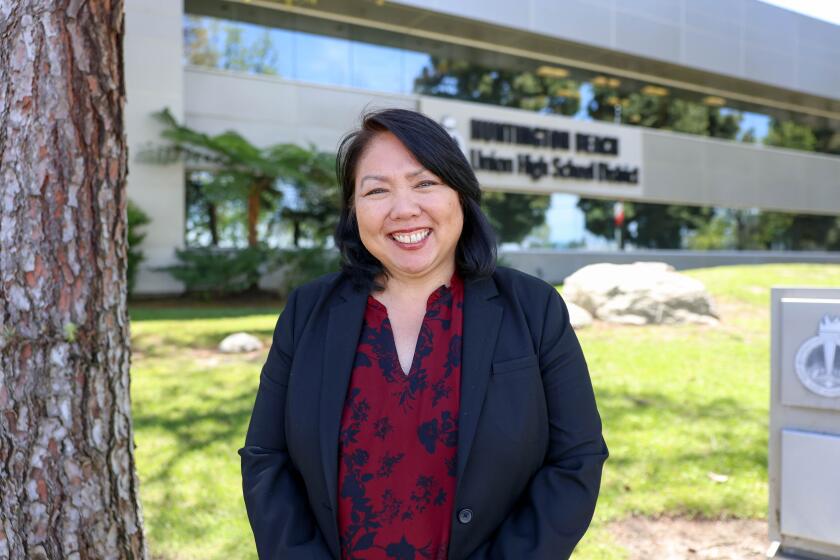Creating with computers
Editor’s note: This corrects the grade level of the students who received netbooks at Davis, Sonora, Paularino and Killybrook elementary schools.
COSTA MESA — Gathered in the multipurpose room at the end of a recent school day, students in Liz Sawyer’s fourth- and fifth-grade combo class awaited the red-carpet premiere of book trailers they had spent the last three months putting together.
When the time was right, the students exited the room and came back in on a red paper “carpet” as their books were announced to cheers from a handful of parents and other students.
“It’s been really fun because we can do whatever we want,” said fifth-grader Kayla Brockman, 10.
Sawyer’s students at Davis Magnet School were the first to create a trailer, similar to a movie preview, for books — a project that wouldn’t have been feasible until this year when about 600 students districtwide were given netbooks, or smaller laptops, to use as their own for the school year.
The Newport-Mesa Unified School District gave fifth- and sixth-grade students at Davis, Sonora, Paularino and Killybrook elementary schools, and seventh-grade science students at Costa Mesa Middle School the netbooks after winning a $400,000 Enhancing Education Through Technology grant, said Jenith Mishne, the district’s director of educational technology.
She said she also applied this month for an additional grant for about 200 netbooks to expand the program to College Park Elementary School.
The federal grant program was established in 2001 through the No Child Left Behind Act to improve academics by improving schools’ technology, according to the state Department of Education.
Mishne, who applied for the grant in 2008, said giving the students laptops helps prepare them for the 21st century workforce.
The students become better-equipped to use technology, navigate the Internet and research online, she said.
“There’s so many things it does,” she said.
The book trailers were just one project that was made possible with the computers.
The students saw the whole process through, from reading the book and discussing it, to writing a trailer, acting it out, directing and shooting the video themselves.
Although the students worked in groups, each one got to edit the footage together, making their own trailer with voiceovers, text and music.
“They’ve been so excited about the project,” Sawyer said. “They’ve been working on it at home.”
In the classroom, the netbooks have turned out to be an asset, said Sawyer, who has been teaching for about 10 years.
The students use them everyday for writing projects, math games, posting on the class blog and utilizing textbook’s online components, she said.
“It’s really increased the students’ interest and engagement in the topic,” Sawyer said.
Sawyer said she was originally concerned the netbooks would be a challenge to incorporate into the classroom, but they have easily fit into their routine.
She also hasn’t had any problems with students using the netbooks to mess around during school, she said.
“They know it’s a special thing, and they don’t want to blow it,” she said.
Student Kayla said the netbooks have given her a new responsibility to make sure she charges it and brings it school everyday.
The students also have to use the computers responsibly, she said.
The school has firewalls that keep students off of sites they should be on, and teachers have the ability to freeze student’s screens, play videos on every computer or pop up documents and websites using special software, Mishne said.
At home though, parents have to act as firewalls, she said.
Kayla’s mother, Becky Brockman, said she isn’t worried about her daughter having her own computer at home.
The school gave all the students information on Internet safety and guidelines on how to use the netbooks, Brockman said.
“They’ve really emphasized being in safe places,” she said.
Having her own computer has made school easier for her daughter and made homework less of a chore, Brockman said.
The other question for the Brockmans is what they’ll do when Kayla gets to eighth grade and no longer gets a school-provided computer.
“I forgot about that,” Brockman said. “What’s going to happen when we don’t have it? We’ve gotten so used to it.”
All the latest on Orange County from Orange County.
Get our free TimesOC newsletter.
You may occasionally receive promotional content from the Daily Pilot.



